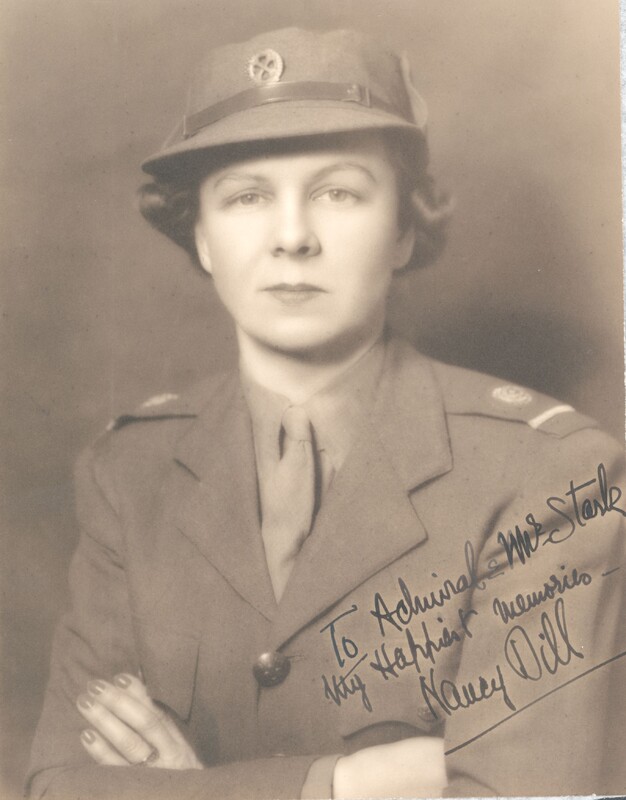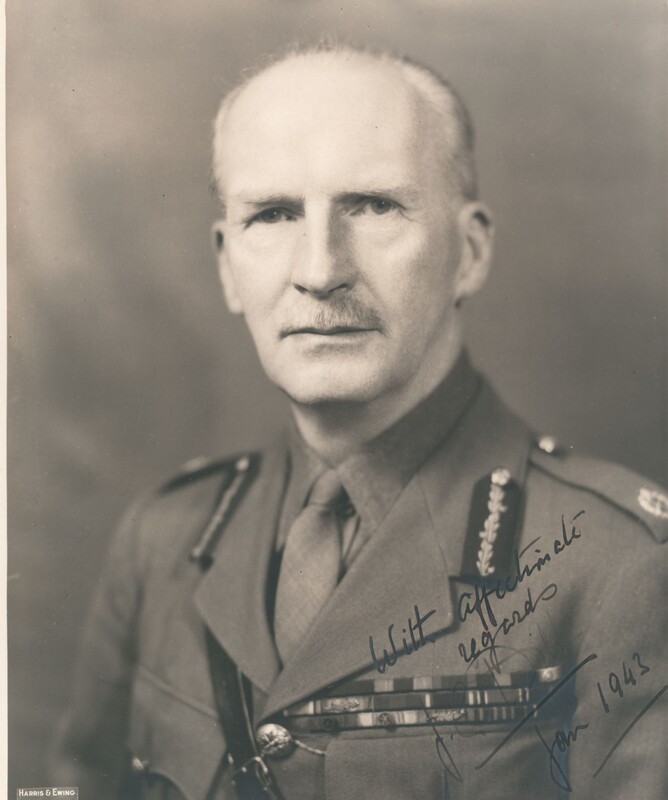Dublin Core
Description
These are two photographs, one by Nancy Dill and one by John Greer Dill with original messages and signatures sent to Admiral Harold Stark in January 1943.
Transcription:
To Admiral & Mrs Stark
My Happiest memories
Nancy Dill
Nancy Isabelle Cecil Charrington Dill (1906-1996) was “a member of the Charrington brewing family and a prominent figure in the American Red Cross, which in the years 1942 to 1944 supplied the US Surgeon General’s department with the vast quantities of dressings through the mass effort of volunteer workers. Her then husband was Field Marshal Sir John Greer Dill, GCB, CMG, DSO (1881-1944) who was the senior British member of the Combined Chiefs of Staff (CCS) in Washington DC. Nancy took a hands-on approach to offering medical aid to the Allied war effort. In 1940 she drove her own car to a French Mobile Field hospital in north-east France. In October 1941 Nancy married the recently widowed Dill. Lady Nancy Dill became very popular in Washington society and repeatedly popped up in news accounts wearing her Red Cross uniform and doing volunteer work” (The British Antique Dealers' Association).
Transcription:
With affectionate
regards
J. G. Dill
Jan[uary] 1943
John Greer Dill (1881-1944) was a senior British Army officer and Field Marshall. Born in Lurgan, Armagh, Ireland, Dill attended Cheltenham College in Gloucestershire, England and the Royal Military College at Sandhurst. During the First World War, Dill was promoted to a Brigade Major, where he commanded the 25th Brigade on the Western Front. They were to join with the British Expeditionary Force and were present during the Battle of Neuve Chapelle in 1915. He was promoted to Major in 1916. In World War II, wrote a memorandum that proposed using chemical warfare against the prospect of a German Invasion. He suggested that the threat of alienation for the states’ was worth the risk because the country should not “hesitate to adopt whatever means appear to offer the best chance of success” ( ). Though many criticized the proposal, Churchill largely endorsed Dill’s words and the Royal Air Force were soon ordered to begin preparations for deploying mustard gas. Though he was promoted to Field Marshal in November of 1941, the tension between Churchill and Dill caused the former to distance themselves. Toward the end of the year, Churchill had Dill advanced to Knight Grand Cross of the Order of the Bath and stationed in Washington D.C., as a personal representative.
He helped create the Combined Chiefs of Staff to coordinate Anglo-American strategy and his command embraced all U.S naval forces assigned to British waters and in the Atlantic coastal waters of Europe. Though he had many favorable outcomes under his service, his career is largely marked by a controversy related to his handling of a decisive conflict during World War II: the attack on Pearl Harbor.
Transcription:
To Admiral & Mrs Stark
My Happiest memories
Nancy Dill
Nancy Isabelle Cecil Charrington Dill (1906-1996) was “a member of the Charrington brewing family and a prominent figure in the American Red Cross, which in the years 1942 to 1944 supplied the US Surgeon General’s department with the vast quantities of dressings through the mass effort of volunteer workers. Her then husband was Field Marshal Sir John Greer Dill, GCB, CMG, DSO (1881-1944) who was the senior British member of the Combined Chiefs of Staff (CCS) in Washington DC. Nancy took a hands-on approach to offering medical aid to the Allied war effort. In 1940 she drove her own car to a French Mobile Field hospital in north-east France. In October 1941 Nancy married the recently widowed Dill. Lady Nancy Dill became very popular in Washington society and repeatedly popped up in news accounts wearing her Red Cross uniform and doing volunteer work” (The British Antique Dealers' Association).
Transcription:
With affectionate
regards
J. G. Dill
Jan[uary] 1943
John Greer Dill (1881-1944) was a senior British Army officer and Field Marshall. Born in Lurgan, Armagh, Ireland, Dill attended Cheltenham College in Gloucestershire, England and the Royal Military College at Sandhurst. During the First World War, Dill was promoted to a Brigade Major, where he commanded the 25th Brigade on the Western Front. They were to join with the British Expeditionary Force and were present during the Battle of Neuve Chapelle in 1915. He was promoted to Major in 1916. In World War II, wrote a memorandum that proposed using chemical warfare against the prospect of a German Invasion. He suggested that the threat of alienation for the states’ was worth the risk because the country should not “hesitate to adopt whatever means appear to offer the best chance of success” ( ). Though many criticized the proposal, Churchill largely endorsed Dill’s words and the Royal Air Force were soon ordered to begin preparations for deploying mustard gas. Though he was promoted to Field Marshal in November of 1941, the tension between Churchill and Dill caused the former to distance themselves. Toward the end of the year, Churchill had Dill advanced to Knight Grand Cross of the Order of the Bath and stationed in Washington D.C., as a personal representative.
He helped create the Combined Chiefs of Staff to coordinate Anglo-American strategy and his command embraced all U.S naval forces assigned to British waters and in the Atlantic coastal waters of Europe. Though he had many favorable outcomes under his service, his career is largely marked by a controversy related to his handling of a decisive conflict during World War II: the attack on Pearl Harbor.

